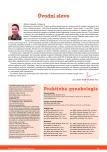Questions around soy isoflavones
Authors:
Tomáš Fait
Authors‘ workplace:
1. LF UK a VFN Praha
; Gynekologicko-porodnická klinika
Published in:
Prakt Gyn 2010; 14(2): 99-101
Category:
Review Article
Overview
Fytoestrogens could theoretically have significant therapeutic potential in climacteric medicine. Inconsistent results of clinical studies could be caused by nonstandard composition of these food supplements and varied metabolism of individual isoflavones.
Key words:
soy isoflavones – equol – efficacy
Sources
1. Writing Group for Women´s Health Initiative Investigators: Risks and benefits of estrogen plus progestin in healthy postmenopausal women: principal results from the Women´s Health Initiative randomized controlled trial. JAMA 2002; 288(3): 321–333.
2. Rossow JE, Prentice RL, Manson JE et al. Postmenopausal hormone therapy and risk of cardiovascular disease by age and
years since menopause. JAMA 2007; 297(13): 1465–1477.
3. Parkin DM. Cancers of the breast, endometrium and ovary: geographic correlations. Eur J Cancer Clin Oncol 1989; 25(12): 1917–1925.
4. Birkhauser MH, Panay N, Archer DF et al. Updated recommendations for hormone replacement therapy in the peri - and postmenopause. Climacteric 2008; 11(2): 108–124.
5. Speroff L, Fritz MA. Clinical gynecologic endocrinology and infertility, Lippincott Williams Wilkins, 7th edition, Philadelphia 2005. 1333.
6. Donát J. Fytoestrogeny – rostlinné hormony v klimakteriu. Praha: DoMeNa 2006 : 110.
7. Duncan AM, Phipps WR, Kurzer MS. Phytoestrogens. Best Practice Research Clin Endocrin Metab 2003; 17(2): 253–271.
8. Ye YB, Tang XY, Verbruggen M et al. Soy isoflavones attenuate bone loss in early postmenopausal Chinese women. Eur J Nutr 2006; 45(6): 327–334.
9. Slíva J. Sójové isoflavony v nevšedních souvislostech. Klimakterická medicína 2010; 15(1): 13–17.
10. Yuan JP, Wang JH, Liu X. Metabolism of dietary soy isoflavones to equol by human instestinal microflora. Mol Nutr Food Res 2007; 51(7): 765–781.
11. Atkinson C, Newton KM, Bowless EJ et al. Demographic, anthropometric, and lifestylefactors and dietary intakes in relation to daidzein-metabolizing phenotypes among premenopausal women in USA. Am J Clin Nutr 2008; 87(3): 679–687.
12. Raimondi S, Roncaglia L, De Lucia M et al. Bioconversion of soy isoflavones daidzin and daidzein by Bifidobacterium strains. Appl Microbiol Biotechnol 2009; 81(5): 943–950.
13. Unfer V, Casini ML, Costabile MD et al. Endometrial effects of long-term treatment with phytoestrogens. Fertil Steril 2004; 82(1): 145–148.14. Palacios S, Pornel B, Bergeon C et al. Endometrial safety assessment of a specific andstandardized soy extract according to internationl guidelines. Menopause2007; 14(6): 1006–1011.
15. Ju YH, Allred CD, Allred KF et al. Physiological concentration of dietary genistein dose - dependently stimulate growth of estrogendependent human breast cancer tumors implanted in athymic nude mice. J Nutr 2001; 131(11): 2957–2962.
16. Wuttke W, Jarry H, Becker T et al. Phytoestrogens: endocrine disrupters or replacement for hormone replacement therapy? Maturitas 2008; 61(1–2): 159–170.
17. Teschke R. Black cohosh and suspected hepatotoxicity: inconsistencies, confounding variables, and prospective use of a diagnostic causality algorithm. A critical review. Menopause 2010; 17(2): 426–440.
Labels
Paediatric gynaecology Gynaecology and obstetrics Reproduction medicineArticle was published in
Practical Gynecology

2010 Issue 2
-
All articles in this issue
- New approaches in the aesthetic surgery of female genitalia
- Questions around soy isoflavones
- Hormonally-active tumours in differential diagnostics of precocious puberty in girls between 1973 and 2008
- Gynaecological surgery techniques in female to male transsexualism.
- Type 1 and 2 diabetes and pregnancy
- The impact of nutrition on the results of IVF/ET infertility treatments
- Chemotherapy-induced premature ovarian failure.
- Using depot medroxyprogesteronacetate as a modern contraceptive method
- Practical Gynecology
- Journal archive
- Current issue
- About the journal
Most read in this issue
- Gynaecological surgery techniques in female to male transsexualism.
- Hormonally-active tumours in differential diagnostics of precocious puberty in girls between 1973 and 2008
- New approaches in the aesthetic surgery of female genitalia
- Type 1 and 2 diabetes and pregnancy
